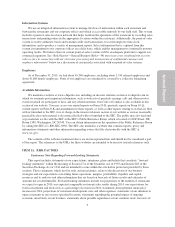Chipotle 2013 Annual Report Download - page 21
Download and view the complete annual report
Please find page 21 of the 2013 Chipotle annual report below. You can navigate through the pages in the report by either clicking on the pages listed below, or by using the keyword search tool below to find specific information within the annual report.
restaurant openings. In addition, stringent and varied requirements of local regulators with respect to zoning, land
use and environmental factors could delay or prevent development of new restaurants in particular locations.
Environmental Laws
We are subject to federal, state and local environmental laws and regulations concerning the discharge,
storage, handling, release and disposal of hazardous or toxic substances, as well as local ordinances restricting
the types of packaging we can use in our restaurants. We have not conducted a comprehensive environmental
review of our properties or operations. We have, however, conducted investigations of some of our properties
and identified contamination caused by third-party operations. We believe any such contamination has been or
should be addressed by the third party. If the relevant third party does not address or has not addressed the
identified contamination properly or completely, then under certain environmental laws, we could be held liable
as an owner or operator to address any remaining contamination, sometimes without regard to whether we knew
of, or were responsible for, the release or presence of hazardous or toxic substances. Any such liability could be
material. Further, we may not have identified all of the potential environmental liabilities at our properties, and
any such liabilities could have a material adverse effect on our operations or results of operations. We also
cannot predict what environmental laws will be enacted in the future, how existing or future environmental laws
will be administered or interpreted, or the amount of future expenditures that we may need to make to comply
with, or to satisfy claims relating to, environmental laws.
Other Aspects of Regulatory Risk
From time to time we are the target of litigation in connection with various laws and regulations that cover
our business. Much of this litigation occurs in California even though currently only about 18% of our restaurants
are located there. As we continue to expand in California, or if we are not able to effectively manage the
increased litigation risks and expenses we have experienced in California, our business may be adversely
impacted to a greater extent than if we did not operate in, or minimized our operations in, California.
Because we do not franchise, the costs of compliance and other risks associated with government regulation
of our business, as described above, may be more pronounced for us than for restaurant companies at which some
or all of these risks are borne by franchisees or other operating contractors.
The effect of recent changes to U.S. healthcare laws may increase our healthcare costs and negatively
impact our financial results.
We offer eligible full-time and part-time U.S. employees the opportunity to enroll in healthcare coverage
subsidized by us. For various reasons, many of our eligible employees currently choose not to participate in our
healthcare plans. However, under the comprehensive U.S. health care reform law enacted in 2010, the Affordable
Care Act, changes that become effective in 2014, and especially the employer mandate and employer penalties
that are scheduled to become effective in 2015, may increase our labor costs significantly. Changes in the law for
2014, including the imposition of a penalty on individuals who do not obtain healthcare coverage, may result in
employees who are currently eligible but elect not to participate in our healthcare plans now finding it more
advantageous to do so, which may increase our healthcare costs. In 2015, we will either adopt a qualifying plan
under the Affordable Care Act for our full-time hourly employees, which will likely increase our healthcare
expenses significantly, or we will be subject to employer penalties, which could also significantly increase our
labor costs. It is also possible that making changes or failing to make changes in the healthcare plans we offer
will make us less attractive to our current or potential employees. And in any event, implementing the
requirements of the Affordable Care Act is likely to impose some additional administrative costs on us. The costs
and other effects of these new healthcare requirements cannot be determined with certainty, but they may have a
material adverse effect on our financial and operating results.
We could be party to litigation that could adversely affect us by distracting management, increasing our
expenses or subjecting us to material money damages and other remedies.
We’re subject to numerous claims alleging violations of federal and state laws regarding workplace and
employment matters, including wages, work hours, overtime, vacation and family leave, discrimination,
19
Annual Report
























